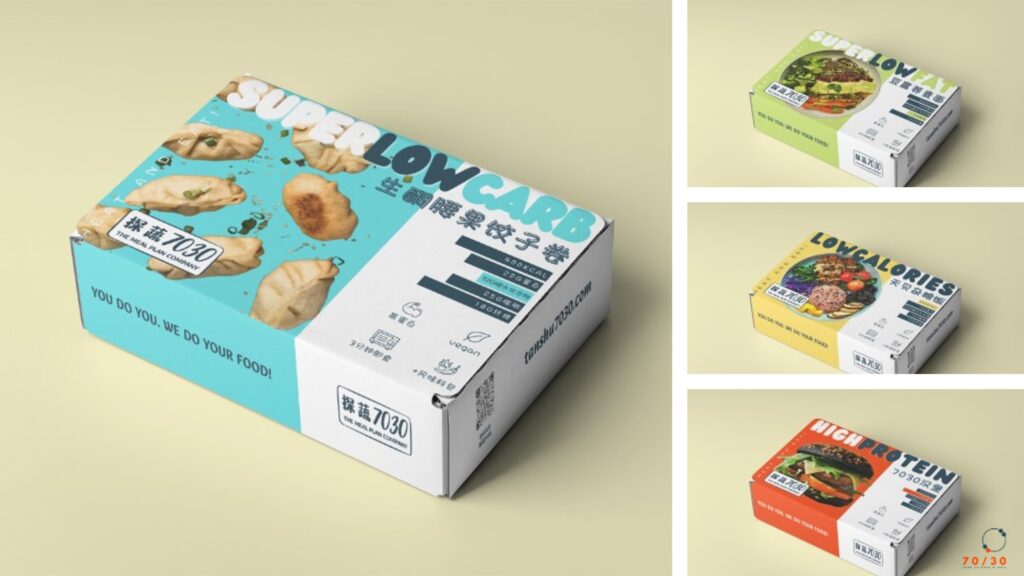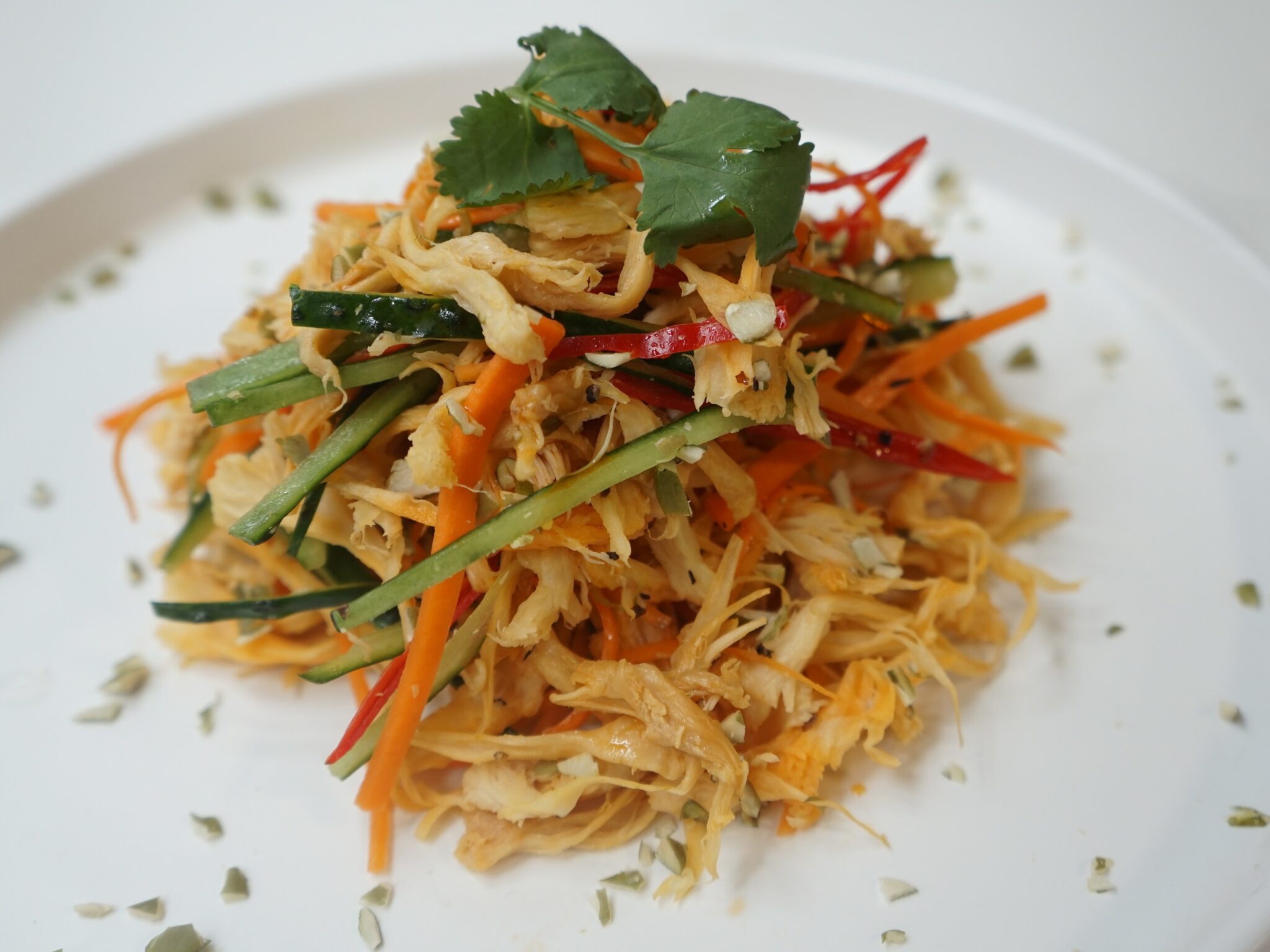70/30 Food Tech Closes $700K Seed Extension & Launches Research Lab for Mycelium Protein
5 Mins Read
Singapore-based 70/30 Food Tech has closed a $700,000 seed extension round, which has helped it launch a research lab to develop mycelium-based protein products, starting with shredded chicken.
70/30 Food Tech’s latest fundraiser saw participation from existing seed investors as well as Better Bite Ventures. The round has facilitated the opening of a Mycelium Research Lab to advance the startup’s R&D into fungi-based proteins.
“We believe that mycelium-based sustainable protein products can be a gateway to broader consumer adoption in Asia, especially given the familiarity and positive perception of fungi in the region,” said Better Bite Ventures founding partner Michal Klar. “We liked 70/30 Food Tech’s product pipeline and unique go-to-market strategy.”
Founded in 2020 by Eve Samyuktha and Mike Huang, F&B consultants working in China’s plant-based sector, the company makes vegan ready meals using its biomass-fermented mycelium chicken. In 2021 alone, as part of its test launch, it shifted 25,000 of these meals.
Now, to scale up and expand further, 70/30 Food Tech has launched its new research lab in Bangalore, a city known as India’s tech hub. “We chose Bangalore not only for the R&D, but also are aiming India as one of our markets for future products,” Samyuktha told Green Queen. “The per capita consumption of meat in India is significantly low compared to [the] rest of Asia. However, there is a rising demand for poultry and we want to be on the brink of it and offer exciting solutions.”
She added: “Having the lab in Bangalore is super cost-effective compared to Singapore, so the iterations and runs are larger in number.”
Using mycelium to offer Asians cost-effective alternative proteins

The company began its initial pilot-scale experiments in biomass fermentation in 2021 at the Shanghai Academy of Agricultural Sciences, with the primary aim of developing affordable alternative protein solutions. Having surveyed several B2B consumers – for whom it makes mushroom- and soy-based proteins, including the Chinese restaurant chain Guaka – the startup concluded that price is a key aspect of protein diversification.
“Achieving cost-efficiency is crucial and food businesses in China and other parts of Asia will likely be interested in products that can offer competitive pricing compared to animal-based products and this, in turn, can attract a larger market share and drive adoption,” said Doris Lee, CEO of GFIC, GFIC, the independent partner organisation of the Good Food Institute APAC.
A report by alternative protein think tank Food Frontier last year found China to be the most favourable market for plant-based food, although India was on the other end of the list. But across Southeast Asia, high price was a key barrier for these foods. Analysis by Asymmetrics Research also found that in China, many middle-income consumers are cutting back their impulse spending and looking for better-value products. Pork and beef prices have fallen, toughening the challenge for plant-based brands trying to sell to foodservice, which is a cost-sensitive approach.
Moreover, a recent study has shown that mycelium production can be done on a large scale and with lower costs, developing a protein that can grow in a relatively short period – days instead of the months or years it takes to grow animal-derived or even plant-based food. With greater investment in resources and infrastructure to cut production costs and educate consumers on mycelium as a potential dietary staple, the authors argue that the fungi ingredient could be a solution for global hunger and food insecurity.
While manufacturing costs are currently under wraps, 70/30 Food Tech will likely be looking to reach price parity with conventional chicken – already one of the cheapest meat products you can buy – sooner rather than later.
70/30 Food Tech to replace existing offering with mycelium chicken

The mycelium study above also extolled the fungi root’s nutritional and environmental benefits. This is important for 70/30 Food Tech too, with Samyuktha noting that the startup is working to get its mycelium certified as a carbon-neutral food – a process that requires extensive data collection.
“Our feedstock is byproducts of other food manufacturers that would be generally regarded as waste, but safe for food reuse,” she explained. “Data required will involve the entire supply chain of the mycelium production, including cost of transportation, how we isolate and extract the parent strains to the downstream processing, storage and packing.”
The study, which was authored by employees of US mycelium meat leader Meati, revealed that mycelium can take on different desired tasting notes through biochemistry and flavour chemistry, while being high in protein with all essential amino acids and micronutrients. It has been shown to lower LDL cholesterol too, with the potential to reduce food waste by valorising the sidestream and be produced in a cost-effective manner.
“Nutritionally, I am excited to say that not only the amino acid profiles are similar to meat, but certain amino acids are significantly higher compared to chicken,” said Samyuktha. Additionally, biomass fermentation allows companies to eschew the extrusion process commonly used for soy protein, while the use of specially mutated fungi strains and bioreactor process designs allows 70/30 Food Tech to follow a close-to-market commercialisation approach.
“The first pilot run successfully gave us the texture of shredded chicken,” the founder said, before adding: “The key challenge is the downstream processing and ‘odour’ removal, which has been very time consuming.” But it’s not just chicken – or meat, for that matter – that’s in the works. “We are dabbling with a possible fatty substitute for traditional cow-milk butter.”
With retail a capital-intensive channel, the focus remains on B2B solutions, where 70/30 Food Tech wants to replace its current offering with its mycelium-based mushroom-soy blend, pending regulatory approval.
The startup was Asia’s first mycelium protein company, while last year, Shanghai-based CellX expanded into the sector too. It’s an industry that has seen a flurry of innovations and developments in the last year. This includes Meati’s launch of a D2C marketplace, chicken nuggets and mycelium jerky SKUs, Esencia Foods‘ whole-cut seafood analogues, Better Nature‘s soybean mycelium chicken, Libre Foods‘ whole-cut chicken breast, and Bolder Foods‘ cheese alternatives.
Plus, investors have shown heightened interest in the sector, with MyForest Foods bagging a $15M Series A extension in June and Infinite Roots securing $58M in Series B funding last month.




